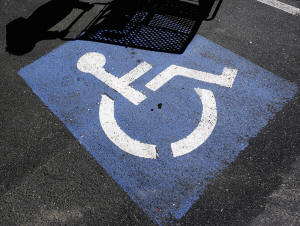The Trump administration withdrew 11 pieces of ADA guidance. How will it
affect compliance?
[April 09, 2025]
By KENYA HUNTER
ATLANTA (AP) — President Donald Trump’s administration withdrew 11
pieces of guidance last month related to the Americans with Disabilities
Act that helped stores, hotels and other businesses understand their
obligation to the law.
The guidance included tips on how to create accessible parking and
fitting rooms, talk to hotel guests about accessible features and decide
when a person with a disability could be assisted by a family member
during hospitals' COVID-19 no-visitor bans. Five pieces of guidance were
from the pandemic, while the oldest two were issued in 1999.
The Department of Justice said removing the guidance was done as part of
a broader effort to reduce regulatory burdens on businesses.
“Putting money back into the pockets of business owners helps everyone
by allowing those businesses to pass on cost savings to consumers and
bolster the economy,” said U.S. deputy assistant attorney general Mac
Warner in a statement.
Disability rights advocates criticized the move, saying it may signal
that the federal government is less likely to enforce the ADA and will
leave it up to businesses on how to comply.
Experts in disability law said the guidance, which was not legally
binding, also helped prevent lawsuits. They say removing helpful
guidance can lead to even more lawsuits and less access for disabled
people.
Here is a look at what was withdrawn and how it might affect the
disabled community and businesses.
What ADA guidance was withdrawn?
There’s no change to the ADA itself, and businesses still have to make
sure customers with disabilities can access services.
Five pieces of guidance specifically addressed COVID-19 concerns,
including modifying visitor bans at hospitals to allow for interpreters
or caregivers. Another document provided a “maintenance list” for retail
stores for ensuring aisles, entrances, parking spaces, elevators and
restrooms were accessible for disabled customers.

Two pieces of hotel and lodging guidance were pulled back. One detailed
how hotel workers should be “informed and attentive to details” that
affect disabled customers, as well as making sure objects in rooms —
like remote controls or adjustable shower heads — are placed
appropriately. The other document provided five steps to help new hotels
comply with the ADA.
Other guidance included inclusive means of getting feedback from
customers, like providing surveys in Braille or electronic formats or
having real-time captions in focus groups; as well as letting people
know how they can get help pumping at self-serve gas stations.
ADA consultant and lawyer Marc Dubin said that even though business
owners weren’t legally required to read the guidance, it was meant to
help them avoid lawsuits and encourage voluntary compliance.
It is routine for guidance to be withdrawn, he said, but what's
important to watch is what the government will replace it with, if
anything.
[to top of second column]
|

The shadow of a person with a shopping cart appears on a disability
parking space in Brunswick, Maine, on Friday, April 21, 2006. (AP
Photo/Pat Wellenbach,File)
 Is it expensive to accommodate
people with disabilities?
Renovating businesses that were built before the ADA was passed in
1990 or adding ramps or widening doorways can be expensive. Many of
the suggestions in the guidance were low-cost, though, like keeping
a parking lot free of obstacles.
Some lawyers say that without the guidance, it might be easier for
businesses to defend themselves against expensive — and what some
small business advocates would consider frivolous — lawsuits
alleging they didn't comply with the ADA.
But complying with the ADA is a good business investment, said Theo
Braddy, the executive director of the advocacy group, the National
Council on Independent Living.
“When your business is fully accessible to all people with all types
of disabilities, they’re going to come. They’re going to spend their
money,” he said.
Will the lack of guidance cause problems?
Disability rights advocates said withdrawing the guidance fits with
the Trump administration's broader effort to get rid of equity
initiatives.
Businesses also might see it as a green light to lower accessibility
standards or avoid making necessary accommodations altogether,
advocates said.
“To the business owners, it’s saying, ‘You ain’t got to do all of
this stuff,’” Braddy said. “It’s going to turn the clock back."
What will enforcement look like?
The Department of Justice is one of the key enforcers of the ADA,
launching investigations and filing lawsuits against businesses it
alleges have violated the law.
Advocates say they're not sure how much Trump's justice department
will enforce the ADA, adding that private lawyers may not be able to
pick up the slack.
“It’s very clear to me that nothing can substitute for a strong,
vigorous Department of Justice," said Chai Feldblum, who served as
the vice chair of President Joe Biden’s AbilityOne Commission, which
created job opportunities for disabled people. "And not having that
will be consequential for the rights of people with disabilities.”
___
The Associated Press Health and Science Department receives support
from the Howard Hughes Medical Institute’s Science and Educational
Media Group and the Robert Wood Johnson Foundation. The AP is solely
responsible for all content.
All contents © copyright 2025 Associated Press. All rights reserved |